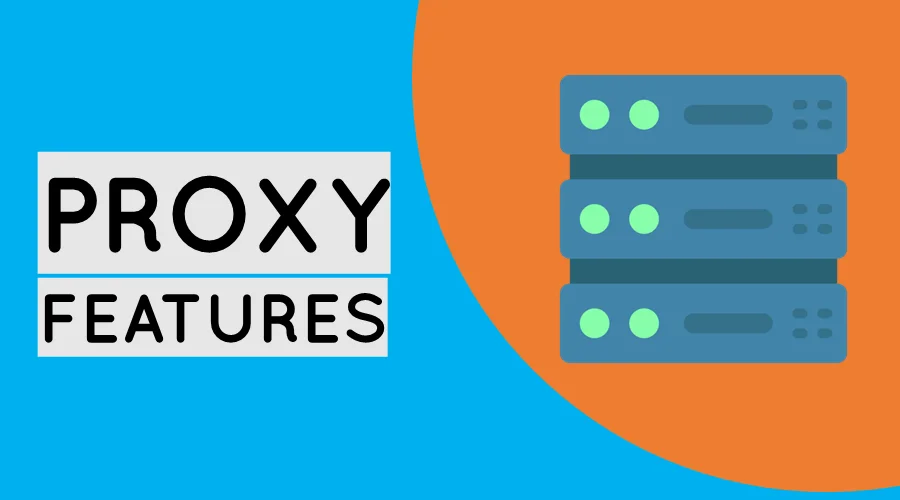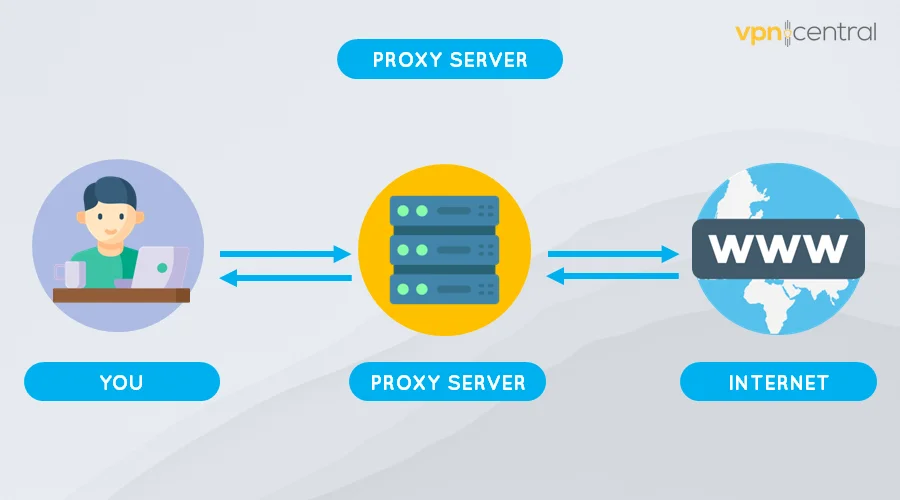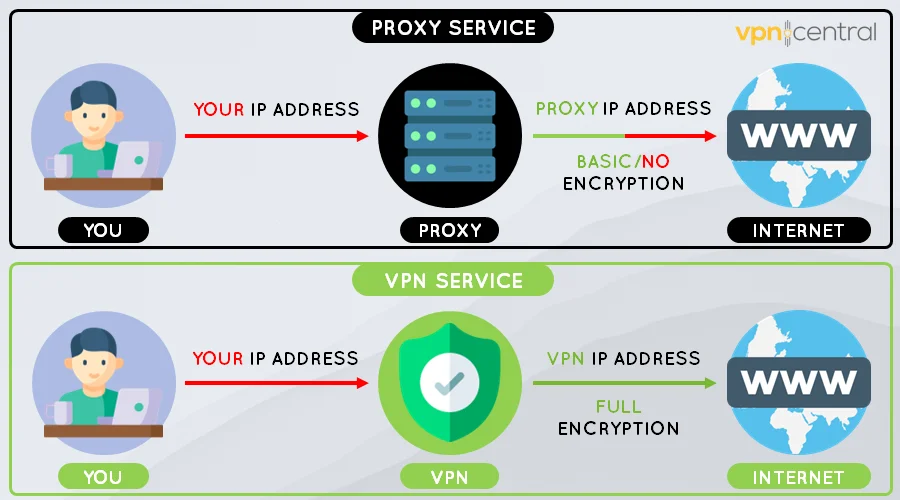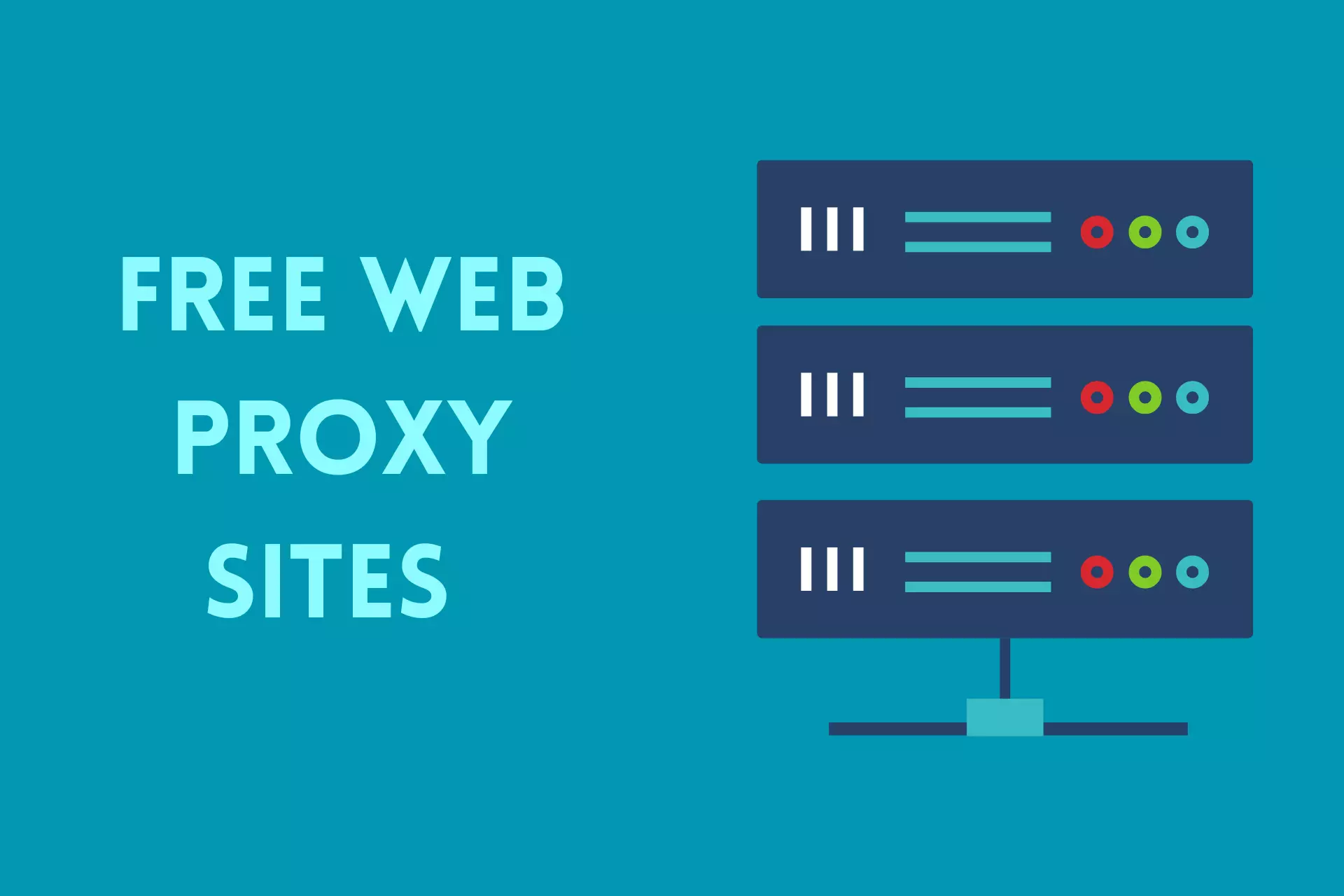What Features Does A Proxy Offer? The Benefits & Risks

You might be asking, what features does a proxy offer?
This isn’t a surprise, especially if your privacy is at stake. Or maybe you’re looking to safeguard your organization against cyber threats.
So count yourself lucky.
Follow me as we uncover how it works, what it offers, the different types available, and more. That way, you’ll be better positioned to decide it’s right for you.
But let’s start with the basics.
What is a proxy?
A proxy server is an intermediary between a user’s device and the internet. It serves as a middleman that manages traffic, ensuring secure delivery to the intended destination.
By performing this role, it not only streamlines connectivity but also provides anonymity. Curious to know how it works?
Here’s the breakdown.
How does a proxy work

A proxy server’s operations comprise:
- Request initiation: It all starts when a user tries to access a web resource. Instead of connecting directly, the request first routes through a proxy server.
- IP address masking: The proxy masks the user’s original IP address to provide anonymity. It then forwards the request to the backend server for processing.
- Data retrieval: The backend server evaluates the context of the user’s request. Once done, it fetches the required data and forwards it back to the proxy.
- Content filtering and evaluation: The proxy server may process the information before relaying it to the user. Some include scanning for malware, filtering restricted content, compressing the data, etc.
- Data Transmission: The proxy server forwards the evaluations to the user once the evaluations are complete. This transmission is often optimized for speed, especially when there’s data compression applied.
- Session Termination: After successful delivery, the proxy server closes the connection. However, it retains a copy of the requested content to speed up similar requests from other users.
That’s how a proxy server works in a nutshell. But here’s what you’ve been waiting for.
What features does a proxy offer?
Proxy servers offer various functionalities that can benefit individuals and businesses. Some of the key features include the following.
Privacy enhancement
It shields visibility by hiding a user’s original IP address. Doing so ensures your online activities remain undisclosed.
The function also protects you from data breaches and eavesdropping. Moreover, it may safeguard organizations and their workforce from possible cyberattacks.
Robust security measures
As earlier mentioned, proxy servers offer defense against cyber threats. They do this by blocking malicious attacks and filtering out harmful requests. This ensures the users and backend web applications remain secure.
Load distribution capabilities
Proxy servers excel in load balancing and distributing incoming user requests. With this, no single backend application gets overwhelmed, especially during peak time.
As a result, this boosts performance while guaranteeing consistent service delivery. Their integration also enables networks to have better uptime, which increases reliability.
Accelerated browsing speeds
Proxy servers can cache frequently requested information to speed delivery. By storing copies of frequented files, they can swiftly deliver this content to users, ensuring a seamless web browsing experience.
Content filtering
Content filtering is sometimes vital to protect the users and backend applications. And there is where proxy servers do exceptionally well.
They can block access to suspicious online resources, alongside stopping malicious requests. This enforces access to relevant and safe information on the web.
Bandwidth savings
Content caching helps accelerate content delivery, as you’re aware by now. Another benefit is it reduces the size of file transfers using compression.
It leads to lesser bandwidth consumption for the end users and organizations. Additionally, you’ll appreciate lower costs, translating into more money in your pocket.
Access to blocked resources
Proxy servers can bypass geo-restrictions and network limitations. This grants users access to otherwise inaccessible resources on the web.
Types of Proxy Servers
Several proxy servers are available, each catering to specific needs and use cases. Some common types include:
- Static proxies: These proxies maintain a consistent IP address for every user request, ensuring stability and reliability.
- Rotating proxies: Designed for dynamic needs, these proxies switch IP addresses with each request. This makes them harder to detect and ideal for tasks like web scraping.
- Residential proxies: These utilize genuine IP addresses linked to specific geographic locations. They’re perfect for tasks requiring high anonymity.
- Data center proxies: These powerhouses are created in large numbers and housed in data centers. They’re fast but might lack the authenticity of residential proxies.
- Anonymous proxies: As the name suggests, these ones prioritize user anonymity, hiding user details when making requests.
- Dedicated and shared proxies: Dedicated proxies are exclusive to a single user, guaranteeing maximum performance. In comparison, shared ones are used by multiple users simultaneously, making them affordable but slower.
- Transparent proxies: Often used by businesses, these proxies are invisible to users. But they work effectively at monitoring and regulating internet usage.
- SSL and HTTP proxies: These are differentiated based on the connection protocols they support. The SSL proxy supports encrypted connections, while HTTP doesn’t.
- SOCKS proxy: Secure socket (SOCKS) proxies operate at a lower level and handle various connection types. These comprise HTTP, HTTPS, and even non-web applications. They’re commonly used for activities like torrenting and accessing restricted services.
- Reverse proxies: These sit in the front of web servers and act as a gateway for client requests. They help distribute incoming traffic, improve performance, and enhance security.
- Forward proxies: They sit between clients and the internet, acting as an intermediary for all outgoing requests.
But why should you really use a proxy?
Benefits of using a proxy server
Proxy servers have tons of benefits to users and businesses. The following are the ones that stand out.
Enhanced online anonymity
We’re in an era where every online move is trackable. Luckily, proxy servers, like VPNs, offer a cloak of invisibility.
They mask user IP addresses, making web activities virtually untraceable. This is vital if you value privacy or are in a country with internet censorship.
Optimized internet speed and bandwidth usage
As earlier noted, proxy servers can store frequently accessed web pages. Doing so enables the speedy delivery of the resources to the users.
The process also reduces the number of requests made to the backend applications. As a result, this optimizes bandwidth usage and improves performance.
Access to geo-restricted content
Many online services and websites restrict content based on geographical location. But proxy servers spoof your location, making it appear you’re in a supported region. You’ll enjoy accessing content from virtually any location on the planet.
Enhanced security and malware protection
Proxy servers add an additional layer of defense against cyber threats. They’re configured to block malicious online resources, reducing the risk of cyber attacks.
But it’s not all bells and whistles.
Proxy server risks
Potential risks can arise when using a proxy. They’re as follows:
Exposure to malicious proxies
Not all proxy servers are created equal. Bad guys can set up fake services to intercept and steal user data.
Being aware of it is crucial to avoid falling victim. Fortunately, we recently tested the best vendors to save you all the hassle.
Lack of end-to-end encryption
While proxy servers mask the user’s IP addresses, they might not encrypt connections. This can cause your sensitive information to leak, risking your privacy.
Potential for slower connection speeds.
Proxy servers can cause slow speeds if they’re far away from the users. The same may also happen when there’s overloading by client requests.
Proxy vs VPN
A VPN is another handy tool for protecting user privacy. Still, it has distinct functions that differ from a proxy.

Here’s how both compare:
- Encryption and security: VPNs are renowned for their end-to-end encryption capabilities, ensuring comprehensive data protection. Proxies might focus solely on web traffic, potentially exposing other data streams.
- Scope and coverage: VPNs bundle all user data, ensuring a comprehensive protective shield. Proxies might be limited to handling specific web requests.
- Cost, efficiency, and use cases: Reliable proxy servers might be more economical than VPNs. However, the level of protection and efficiency can vary based on the chosen proxy/VPN type.
Summary
Again, what features does a proxy offer? As you’ve seen, there’s quite a number.
These range from basic user security to safeguarding your privacy. Moreover, you can count on one to unblock geo-restricted content online.
You can also safeguard your web resources against cyber threats using a proxy. This will lead to better uptime and faster delivery of services.
Read our disclosure page to find out how can you help VPNCentral sustain the editorial team Read more






User forum
0 messages